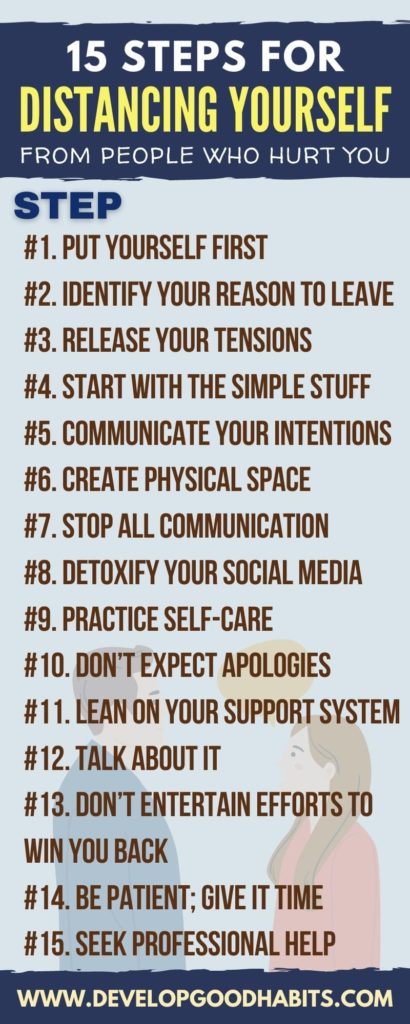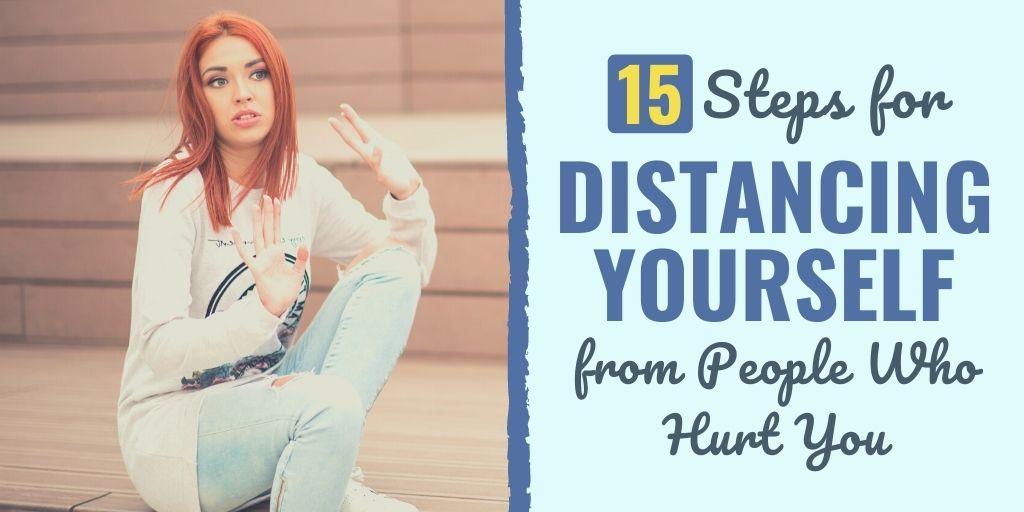People can be toxic. In fact, research shows that 80 percent of Americans have been emotionally hurt – whether at work, school or home.
It can be a friend dragging you down or that jerk you can’t avoid at work. It could also be a close family member who thinks having blood ties justifies lousy behavior.
Whoever it is that makes you stressed out, discouraged and hurt… it’s time to seriously consider distancing yourself. Maybe it shouldn’t have gone on for as long as it has? Maybe you didn’t realize it until someone else pointed it out to you.
But here it is. And, sometimes, you have to let go for the sake of your mental health and serenity.
What Is Emotional Distancing?
Emotional distancing, also called emotional detachment, is the unwillingness to bond with other people emotionally. Distancing yourself helps protect you from anxiety, stress, or unwanted drama.
For others, the distancing is not always intentional. For example, you may distance yourself to avoid explaining the cause of your detachment.
Emotional distancing can be helpful if used well. It helps to set boundaries with some people or groups that put you down. It also helps you avoid being too close to people who demand too much emotional attention of you.
However, emotional distancing can be hurtful… especially if you are not the one to control it. You might feel numb or mute… a situation known as emotional blunting. It's a symptom or problem that requires to be addressed by a mental doctor.
What it Means to Distance Yourself
Creating space from someone does not mean just physical detachment. It also means disconnecting from emotions and feelings towards them.
Distancing yourself from a particular person or relationship means cutting all ties with them temporarily to re-examine things. There is zero interaction, which sometimes results in driving them away completely from your personal life.
Emotional distancing does not mean you hate the person or stop caring about them. Instead, it means you are taking a step back to weigh the effects of that relationship on your mental health and staying away for your own sake – because you are your first priority.
Emotional distancing can also be gradual, in which case you slowly become less and less available. You can also tell the person directly that it is better you part ways for a while for the sake of your happiness.
Contrary to what many people think, emotional distancing and taking some time to breathe is one of the most honorable things you can do for your health.
Why Would Someone Choose To Distance Themselves?
There are many reasons why someone would decide to emotionally distance themselves from others. These include:
Mental and Physical Effects of Hurtful or Toxic Relationships
A hostile relationship can significantly impact both your physical and mental health. Some effects of a hurtful relationship include;
15 Steps to Distance Yourself from Hurtful Relationships
When your mental and physical health is at risk due to somebody else’s behaviors and actions, it's time to let them go!
If you've decided to let them go, GOOD! But how do you do it?
Below are 15 steps for distancing yourself from someone who hurt you. I have also included some valuable advice to assist you in getting through the difficult first few days of separation.
1. Put Yourself First
It’s time to think about your happiness and well-being because those who hurt you clearly may not care.
Maybe you’re the one always giving, and they’re always talking, but you get negative energy in return.
Even if you value your relationship with this person, don’t sacrifice your well-being while supporting them.
If it hurts to stay, think about yourself and realize that it’s time to cut ties.
2. Identify Your Reason to Leave
Ask yourself why you have decided to create a space from the relationship. Have your feelings towards that person developed gradually or did you get them in your first conflict?

Having a solid reason to leave is essential. Without a solid reason, you might fall in and remain in the relationship or leave only to regret it.
Identifying the reason will make it easier to focus on why you are letting go, and you will be less likely to return.
3. Release Your Tensions
Releasing the emotions you feel about quitting a problematic relationship is a crucial step.
You can choose to dance or cry. Whatever it is, it is healthy to release these emotions instead of holding grudges.
Creating an outlet will enable you to release tension and prevent uttering things you will regret later.
4. Start With The Simple Stuff
Quitting a relationship is just like quitting smoking. It can be hurting and a shock to your entire system.
In some cases, starting small is the best way. You can remove yourself slowly, a little at a time.
For instance, you may start by erasing the pictures you took together. Then delete old messages the other day. As you gradually let go of the past, your emotions will be in control.
However, the relationship may be traumatic in other cases due to mistreatment or domestic abuse.
Moving gradually in this situation might worsen the situation and cause more pain.
In such a case, consider talking to an expert specializing in these kinds of relationships before taking any step.
5. Communicate Your Intentions
Communication is very critical in all relationships. It is even more critical, especially when issues arise in a relationship.
Thus, it is healthy to open communication. Be honest and tell the person why you want to detach yourself from them.
It is essential to tell the person why you want to distance yourself from them. This can help them realize their mistakes and change if that’s possible with them.
6. Create Physical Space
To cut ties with someone, creating physical distance between you is the most obvious thing you should do.
You can never emotionally distance and cut all links if you are physically surrounded by that person all the time.
This may need some preparation or spending, but it's worth your peace of mind.
7. Stop All Communication
After communicating with this person, create space by cutting all communication—no calls, no texting. Complete blackout!
You can even block their number if you feel the need to do so.
If the person texts after you have told them you are detaching from them, you have the right to snub their texts, and you won’t feel bad about it.
8. Detoxify Your Social Media
You can’t stay away from somebody if you often see their face or updates on your social media. You will eventually have the urge to message them.
Therefore, blocking this person from your social media accounts is the best and the easiest thing to do.
By doing this, you won’t see them and won’t feel tempted to chat with them and keep the connection between you alive.
9. Practice Self-care
When hurting, it usually feels like there is nothing but pain. Engaging in self-care may look like saying “no” and setting boundaries.
Self-care can help you do the things that bring happiness and comfort. It also enables you to listen to your own needs first.
The more you apply self-care in your life, the more empowered you will be. Hence, your pains won’t overwhelm you.
Focusing on your life is essential. However, you are the one to choose between dealing with the pain you have experienced or giving in to depression – the earlier is a better option.
Thinking about the person who offends you will bring you back the pain and anguish and even slow you down – You need your positive energy.
Keep focusing on the things that you treasure – those that leave you fulfilled.
But don't forget your physical self-care too. Eating healthy, proper rest, staying hydrated and a little exercise will keep your body in shape.
10. Don’t Expect Apologies
Expecting an apology will just delay the process of letting go. Instead, concentrate on your healing by accepting that the person will not apologize.
For the sake of your healing, work on your forgiveness. Forgiveness is very important in the healing process.
It helps to let go of anger, sadness, guilt, shame, or any other feeling that you might be experiencing and move on.

11. Lean On Your Support System
Emotionally distancing from somebody important in your life can be challenging.
Therefore, you need to get a strong support system to ensure you go through this the best way possible.
Spend your time with family and friends that care about you and want the best for you. It is also an excellent way of limiting isolation.
Open your heart to them to get advice and care from them. Nobody should be alone while going through something like this.
With your family members and friends, you rest assured that you still have amazing people around you. It will make your pain less painful and the healing process shorter.
12. Talk About It
When dealing with a situation that hurts you or painful feelings, permit yourself to bring it out by talking about it.
You can’t let go at times since you feel you aren’t permitted to talk about your feelings.
This might be because the people surrounding you are busy with their own issues and there's no one to lend you an ear. You may also be ashamed to talk about your feelings.
Talking about it is essential. You can try to find a therapist or friend who is patient enough to hear your problems.
13. Don’t Entertain Efforts to Win You Back
Staying strong is one of the most complex things to do when distancing yourself from somebody. Remain strong when that person tries to talk to you.
It will open the connection between you. The person may be willing to keep you in their life. They may try to call, message, or even meet you by chance.
It can be tempting to respond to this person. However, after you have entirely distanced yourself from them, you can catch up with them later if you feel like you want to.
However, you are not strong enough in this stage of trying to detach them from your life. Instead, you will find yourself inviting them back into your life.
Therefore, ensure you have blocked their number, stayed away from them, and avoided going places they could be.
14. Be Patient; Give it time
Cutting ties with people is a gradual process, and it takes a lot longer. Therefore, it is important to practice patience. It might take years to detach from somebody completely.
It can take even longer, especially if that person has an essential place in your life.
Unluckily, there is no easy remedy to cut ties with somebody and move on.
Therefore, keep avoiding them and stay encircled by people that care for you. You will eventually forget about them.
15. Seek Professional Help
Letting go of a painful experience can be a struggle, even for the strongest at heart. It can also be challenging to implement these steps alone.
Therefore, it is good to seek help from an experienced professional for guidance through the process.
Final Thoughts on Distancing Yourself
To let go is very painful. A conscious decision to do so is required to control the situation. It takes time and practice.
Be kind to yourself as you practice focusing on the situation and delight in the victories you have, however small.
Caring excessively about another person’s life and issues can harm your emotional and physical health. Distancing yourself can give you the emotional space you require to take good care of yourself.
While there is a risk of short-term stress or anxiety during the process, the end game is to relieve the source of that stress. Once that happens, you’ll be well on your way to a happier and calmer you.
Read our article on 9 proven ways to relieve your stress to have some tips in hand, in case you do experience increased stress and anxiety as you try to distance yourself from a toxic relationship.


